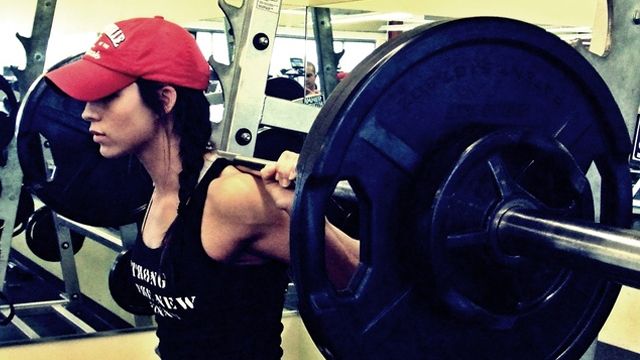
In today’s PT Intel personal trainer Kathleen Trotter talks about how necessary strength training is, no matter what your fitness goals are. Besides being a personal trainer, Kathleen lives her advice, having completed 10 (count ’em!) marathons, an Ironman (well, Ironwoman to be more accurate) and 7 half Ironmans. You can also find her on Twitter.
Don’t be afraid to strength train! As a (partially reformed) endurance junkie, I speak from experience! Strength exercises, and the muscles that come with them, are a good thing! I am sure most people could benefit from infusing more true strength work into their routine, but from personal experience I know that both women, and endurance athletes, REALLY need to learn to embrace weights.
First, a clarification, when I say “strength training” I am not talking about core work. Most female and / or endurances athlete I know (including myself), love a good core session. By “strength training,” I mean exercises like squats, lunges, dead-lifts, push-ups etc.
I resisted fully embracing strength training for a long time. Don’t get me wrong, I have always done weights, but I never prioritized that as highly as my triathlon training, and I always lifted light to moderate weights for 12 to 15 reps. I also have to admit, I still love a good run, and I could still drastically improve my strength, but I no longer prioritize my cardiovascular training above all else. I am proud to admit that I now enjoy my strength sessions (which include flipping tires and strength exercises like dead-lifts), as much as most of my runs. For an endurance junkie like myself, that is BIG.
Reforming Strength Training Stereotypes
Unfortunately, even though it is 2013, and many of the gender stereotypes surrounding women being active have been broken, many women and / or endurance junkies still tend to have an ambiguous relationship with pure strength training. Pretty much daily one of my clients tells me that “I want to strength train and tone up, but I don’t want to get too strong, or too bulky.”
My usually response is a detailed explanation of why that shouldn’t be a worry — it is almost impossibly for women to “get big” unless they really try — it is just not in our genetics. Similarly, endurance athletes, unless predisposed genetically to easily gain muscle, will have a hard time putting on mass, since cardiovascular activity, of which they do excessive amounts, is catabolic (i.e. it breaks down muscles tissue). Even many men who don’t do endurance athletics, and do prioritize strength training, still find that it takes dedication to elicit a hyper-trophic (muscle growth) response.
Unless an individual is predisposed to gain muscle, bulking up takes dedication, and a concentrated effort to consume enough calories. You need to eat enough food to build muscle. Most women and / or endurance athletes are too concerned with dieting and low calorie foods to ever eat enough to gain significant muscle. Plus, in general, to create a hyper-trophic response you need to do four plus sets of an exercise with an appropriately heavy weight for six to 12 repetitions. Most women and endurance athletes don’t lift within that range, and when they do, they don’t use an appropriately heavy weight to result in hypertrophy. If you do 10 reps of an exercise with a weight you can actually do 20 reps with (as many woman do), hypertrophy will not occur.
Stop Worrying About Overbulking
The purpose of this blog post is to state that, although the above response is technically correct, it doesn’t question why everyone is worrying about bulking up in the first place. There is a problem that so many women (myself included — although I am working on it) have such a fear of gaining muscle. What is wrong with being strong and having muscles? Strength is good! Strength will help you have better posture, protect your back, walk with confidence, perform every day activities with ease, improve bone strength and improve your athletic achievements. For me, strong legs allow me to attack hills while running and biking with ease, and a strong upper body helps me pull myself through the water with power and precision.
The main take-away is that working out is not just about how you look, it is about how you feel and your quality of life. Regardless of how you aesthetically react to exercise, moving will make you feel better. Stop worrying about societal norms of how much muscle females and endurance athletes “should” poses. Re-frame the concept of a muscular body — don’t think of muscles as “excess bulk,” frame muscles as strong and beautiful. Remember, all bodies will respond to exercise in different ways!
Enjoy being active — appreciate that you can move! Don’t work out to look a certain way — workout to feel a certain way!